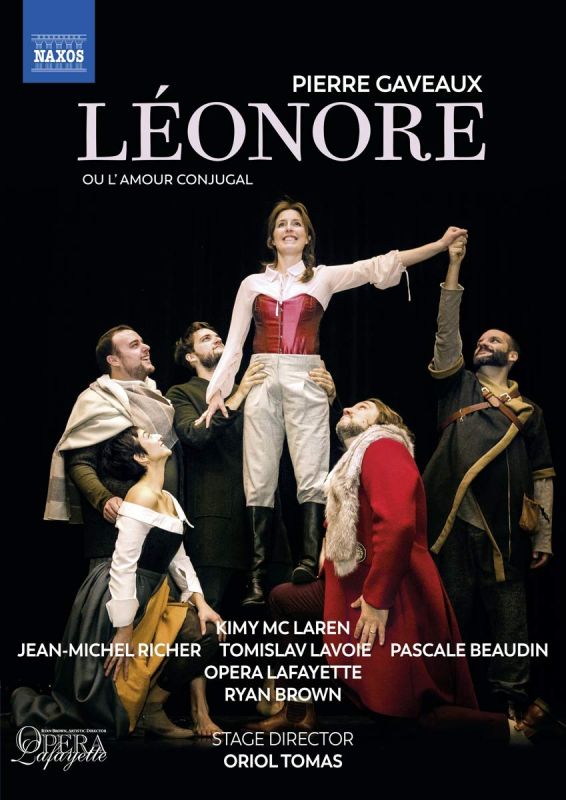GAVEAUX Léonore (Brown)
View record and artist detailsRecord and Artist Details
Composer or Director: Pierre Gaveaux
Genre:
Opera
Label: Naxos
Magazine Review Date: 02/2019
Media Format: CD or Download
Media Runtime: 82
Mastering:
DDD
Catalogue Number: 2 110591

Tracks:
| Composition | Artist Credit |
|---|---|
| Léonore |
Pierre Gaveaux, Composer
Alexandre Sylvestre, Dom Fernand, Bass-baritone Dominique Côté, Pizare, Baritone Jean-Michel Richer, Florestan, Tenor Keven Geddes, Jacquino, Tenor Kimy McLaren, Léonore; Fidelio, Soprano Lafayette Opera Chorus Lafayette Opera Orchestra Pascale Beaudin, Marceline, Soprano Pierre Gaveaux, Composer Ryan Brown, Conductor Tomislav Lavoie, Roc, Bass |
Author: Richard Lawrence
And what of the composer? Pierre Gaveaux (1760-1825) was a professional singer, accomplished enough to sing Florestan in his own opera. Léonore is an opéra comique, that is to say an opera with spoken dialogue between the musical numbers; and provided you try to put Fidelio out of your mind you will enjoy this performance from New York. Easier said than done, as Beethoven’s librettists followed Bouilly closely. The resemblance, not surprisingly, is more to Beethoven’s first version of 1805 (now known, confusingly, as Leonore) than to the Fidelio of 1814. Thus, unlike Fidelio, the opera opens with the solo for Marceline, followed by the duet with Jacquino, and includes the duet for Marceline and Léonore that became Beethoven’s ‘Um in der Ehe froh zu leben’. And, as in 1805, the arrival of Dom Fernand and the final jubilation take place in Florestan’s subterranean cell.
If Bouilly’s stagecraft has a fault, it is that there’s too much dialogue – Léonore’s detailed explanation when confronting Pizare with the pistol lowers the dramatic temperature – and the scene where Pizare bribes Roc takes place offstage. Gaveaux’s music, charming in the domestic scenes, attains real depth in the ominous introduction to Act 2. And there are telling moments, such as the minor-key ending of the major-key trio in the dungeon. Oriol Tomas’s production is straightforward, with a simple set and period costumes by Laurence Mongeau. The cast speaks the dialogue well, though Léonore’s reaction to Roc’s mentioning that the unknown prisoner – Florestan – has been incarcerated for two years borders on the casual.
Opera Lafayette is based in Washington DC but all the singers are Canadian. Kimy Mc Laren makes a believable Léonore/Fidélio: forthright, valiant, tender in the dungeon scene, and with bright, fearless top notes. Jean-Michel Richer as Florestan, improbably well groomed, is just as credible: he is particularly impressive when begging Roc for help. Without a big aria – no ‘Ha! Welch ein Augenblick!’ for him – Pizare is, so to speak, even more one-dimensional than Beethoven’s Don Pizarro, but Dominique Côté manages to be both threatening and sly; while Tomislav Lavoie points up the dilemma of Roc, the loving father prepared to connive at Pizare’s plan to murder Florestan. Of the minor characters, Pascale Beaudin is an enchanting Marceline, turning her aria into a fandango. The high tenor line gives the Prisoners’ Chorus a particularly wistful air. The orchestra under Ryan Brown play with spirit. This is an enterprising and rewarding production, well worth 82 minutes of your time.
Discover the world's largest classical music catalogue with Presto Music.

Gramophone Digital Club
- Digital Edition
- Digital Archive
- Reviews Database
- Full website access
From £8.75 / month
Subscribe
Gramophone Full Club
- Print Edition
- Digital Edition
- Digital Archive
- Reviews Database
- Full website access
From £11.00 / month
Subscribe
If you are a library, university or other organisation that would be interested in an institutional subscription to Gramophone please click here for further information.




